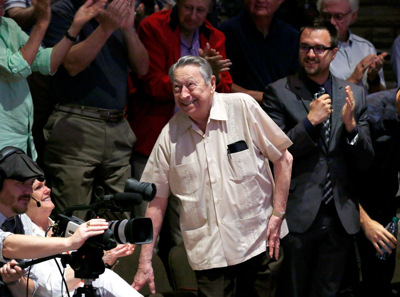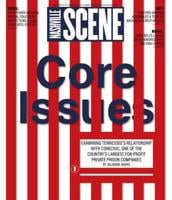
Scotty Moore in 2014.
When guitarist Scotty Moore died Tuesday at the age of 84, his name had long ago become legend. On the evening of July 5, 1954, Elvis Presley, Moore, Bill Black and Sam Phillips were in Sun Studios at 706 Union Street in Memphis, Tennessee. They had been working on ballads for hours, but not capturing anything that truly excited them. Taking a break from the hard work and frustration, Presley picked up his guitar and began singing a frantic version of the Arthur Crudup blues number “That's All Right.” Just notes into the song, Moore and Black jumped in. Hearing the tune from the production booth, Phillips came into the studio and said, “Back up, try to find a place to start, and do it again!”
It’s a story that has been told many times. Presley struck the spark and Phillips recognized its potential, but what is too often overlooked is the nurturing that Bill Black and particularly Moore provided. Presley’s impromptu mash-up of country, R&B and pop styles brought the flash of flint against steel, but Moore provided the guitar sound that brought the flame roaring to life.
Born just outside the small West Tennessee community of Gadsden on December 27, 1931, Winfield Scott Moore III was a skinny, introverted boy. The Moores were a musical family; Scotty’s father and brothers all played instruments, and Scotty soon found himself attracted to the guitar. Joining the U.S. Navy in 1948 at the age of 16, Moore spent four years travelling around the world and playing music in small ad hoc bands on ships or naval bases where he was stationed. He also married and became a father before his 19th birthday.
When he was discharged from the Navy in 1952, Moore had no desire to return to the farm life of his childhood and found employment in Memphis. Working at a dry cleaner during the day, he focused on his music at night, forming a local country band, The Starlite Wranglers, with bassist Bill Black.
In May 1954, the Wranglers cut a single for Sun Records. While the disc went nowhere, label head Phillips saw potential in Moore and Black as sidemen and decided to match them up with Elvis Presley, a young ballad singer he had discovered. Although Moore was strictly playing country music and had a style heavily influenced by the reigning hillbilly guitar hero Chet Atkins, he couldn’t escape the simmering stew of musical styles that filled Memphis.
The most popular radio show in town was Red, Hot and Blue on station WHBQ, a mad mix of hillbilly, R&B, pop and scattershot talk from motor-mouth DJ Dewey Phillips. In addition, WDIA, the first radio station with all-black programming, was pumping R&B and gospel into the airwaves and attracting young, white listeners in droves.
It was in that heady atmosphere that Elvis Presley picked up his guitar and merged three musical genres in a few seconds of pure fun, and Moore knew right where he was coming from. In the weeks and months that followed that eventful July evening, Moore brought a classy but electrifying style of fingerpicking to Presley’s records. In live appearances, Moore’s steady hand and trademark smile provided the foundation for Presley’s wild performances, as well as supplying inspiration for rock ’n’ roll guitarists around the world.
But as Presley’s star rose, Moore’s and Black’s contributions were pushed out of the spotlight, particularly after ex-carnival barker Col. Tom Parker took over Presley’s management. The Colonel saw Moore and Black simply as sidemen and treated them as easily replaceable hired hands. When Elvis was drafted into the U.S. Army in 1958, the Colonel unceremoniously gave Moore and Black their walking papersl.
While such indignities stung, Moore never wallowed in disappointments. Switching his focus to the production room, he became a partner and producer for the Memphis label Fernwood Records with former Sun Records engineer “Cowboy” Jack Clement. When Fernwood shut down in 1960, Moore returned to Sun Records, becoming the production manager for the label’s new, state-of-the-art studio.
That same year, Presley returned from the army, and one of his first calls was to Moore, asking him to return to the studio as his guitarist. Moore agreed out of loyalty to his old friend, but the business lines were plainly delineated by the Colonel. Although Moore continued to work occasional studio sessions with Presley through 1967, it was repeatedly made clear that he was a hired hand and nothing more.
In 1964, Moore left Sun and Memphis for greener pastures in Nashville. After recording the instrumental album The Guitar That Changed the World with producer Billy Sherrill for Epic Records, Moore became a partner in the Music City Recorders studio. Over the next nine years, he produced or engineered hundreds of sessions. Although country recordings comprised the majority of his work, in 1968 Moore struck a partnership with soul producer and DJ “John R” Richbourg. Working with a small team of Nashville studio musicians that became known as the “Music City Four,” they recorded dozens of classic southern soul records for the Sound Stage 7 label, including Joe Simon’s 1969 No. 1 R&B hit “The Chokin’ Kind,” winner of a Grammy Award for Best Male R&B Vocal Performance.
In 1968, Moore reunited with Presley for a T.V. special that reenergized the singer’s flailing career. The image of Presley, dressed in a black leather jumpsuit and rockin’ the house with Moore on guitar became one of the most iconic images of Presley’s career. But despite the triumph, when Presley returned to the studio, Moore was left behind. The two old friends never reunited.
In the decades after Presley’s death in 1977, Moore received the accolades and attention so long denied him. He was inducted into the Rock & Roll Hall of Fame in 2000. Guitarists from around the world have recognized his contributions. As Rolling Stones guitarist Keith Richards told Moore’s biographer, James Dickerson, in 1997: “Everyone else wanted to be Elvis — I wanted to be Scotty."
On July 5, 2014, 60 years to the day from that hot, sweaty evening at Sun Studios in Memphis, Moore was at the Country Music Hall of Fame and Museum for a program honoring singer and songwriter Buzz Cason. When the moderator announced Moore’s presence in the audience and the significance of the date, the crowd rose to offer an enthusiastic ovation. Moore greeted the accolades with only his trademark smile and a modest wave. As with his entire career, he came to support a friend and not seek personal recognition.





